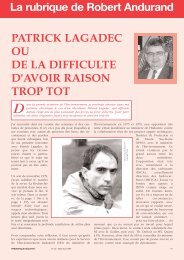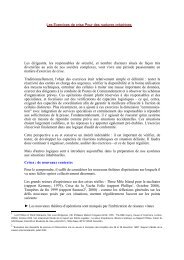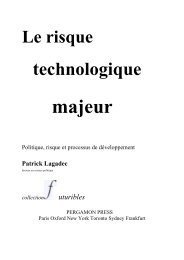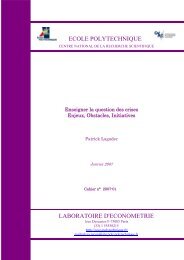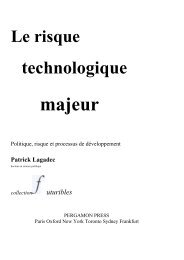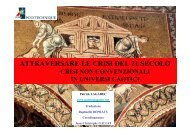- Page 1 and 2:
STATES OF EMERGENCYTechnological Fa
- Page 3 and 4:
viiiContents- Edgar Fasel..........
- Page 5 and 6:
IntroductionIn recent years, a whol
- Page 7 and 8:
Introduction 3And what goes for maj
- Page 9 and 10:
Introduction 5It is not hard to mea
- Page 11 and 12:
Introduction 7Look for example at t
- Page 13 and 14:
PART ONETechnical Breakdown,Crisis
- Page 15 and 16:
12 Technical breakdown, crisis and
- Page 17 and 18:
14 Technical breakdown, crisis and
- Page 19 and 20:
16 Technical breakdown, crisis and
- Page 21 and 22:
18 Technical breakdown, crisis and
- Page 23 and 24:
20 Technical breakdown, crisis and
- Page 25 and 26:
22 Technical breakdown, crisis and
- Page 27 and 28:
24 Technical breakdown, crisis and
- Page 29 and 30:
26 Technical breakdown, crisis and
- Page 31 and 32:
28 Technical breakdown, crisis and
- Page 33 and 34:
30 Technical breakdown, crisis and
- Page 35 and 36:
32 Technical breakdown, crisis and
- Page 38 and 39:
Organizations with their backs to t
- Page 40 and 41:
Organizations with their backs to t
- Page 42 and 43:
Organizations with their backs to t
- Page 44 and 45:
3. In the thick of thingsThe most r
- Page 46 and 47:
MARC BECAMThe oil spill from the
- Page 48 and 49:
M. Becam: The "Amoco Cadiz" 47Trava
- Page 50 and 51:
M. Becam: The "Amoco Cadiz" 49quest
- Page 52 and 53: M. Becam: The "Amoco Cadiz" 51M. BE
- Page 54 and 55: M. Becam: The "Amoco Cadiz" 53way:
- Page 56 and 57: RICHARD THORNBURGHThree Mile Island
- Page 58 and 59: R. Thornburgh: Three Mile Island 57
- Page 60 and 61: R. Thornburgh: Three Mile Island 59
- Page 62 and 63: R. Thornburgh: Three Mile Island 61
- Page 64 and 65: R. Thornburgh: Three Mile Island 63
- Page 66 and 67: R. Thornburgh: Three Mile Island 65
- Page 68 and 69: D.K Burrows: Mississauga 67We chose
- Page 70 and 71: D .K Burrows: Mississauga 69look af
- Page 72 and 73: D.K Burrows: Mississauga 71D.K. BUR
- Page 74 and 75: D.K Burrows: Mississauga 73P.L.: No
- Page 76 and 77: 76 Technological crises and the act
- Page 78 and 79: 78 Technological crises and the act
- Page 80 and 81: 80 Technological crises and the act
- Page 82 and 83: 82 Technological crises and the act
- Page 84 and 85: EDGAR FASELSchweizerhalleand the po
- Page 86 and 87: 86 Technological crises and the act
- Page 88 and 89: 88 Technological crises and the act
- Page 90 and 91: PHILIPPE VESSERONThe case of the Se
- Page 92 and 93: 92 Technological crises and the act
- Page 94 and 95: 94 Technological crises and the act
- Page 96 and 97: 96 Technological crises and the act
- Page 98 and 99: 98 Technological crises and the act
- Page 100 and 101: 100 Technological crises and the ac
- Page 104 and 105: 104 Technological crises and the ac
- Page 106 and 107: 106 Technological crises and the ac
- Page 108 and 109: 108 Technological crises and the ac
- Page 110 and 111: Technological crises and the actors
- Page 112 and 113: Technological crises and the actors
- Page 114 and 115: 114 Technological crises and the ac
- Page 116 and 117: 116 Technological crises and the ac
- Page 118 and 119: 118 Technological crises and the ac
- Page 120 and 121: 120 Technological crises and the ac
- Page 122 and 123: 122 Technological crises and the ac
- Page 124 and 125: 124 Technological crises and the ac
- Page 126 and 127: 126 Technological crises and the ac
- Page 128 and 129: 128 Technological crises and the ac
- Page 130 and 131: 130 Technological crises and the ac
- Page 132 and 133: 132 Technological crises and the ac
- Page 134 and 135: 134 Technological crises and the ac
- Page 136 and 137: 136 Technological crises and the ac
- Page 138 and 139: 138 Technological crises and the ac
- Page 140 and 141: 140 Technological crises and the ac
- Page 142 and 143: 142 Technological crises and the ac
- Page 144 and 145: 144 Technological crises and the ac
- Page 146 and 147: 146 Technological crises and the ac
- Page 148 and 149: 148 Technological crises and the ac
- Page 150 and 151: 150 Technological crises and the ac
- Page 152 and 153:
152 Technological crises and the ac
- Page 154 and 155:
154 Technological crises and the ac
- Page 156 and 157:
156 Technological crises and the ac
- Page 158 and 159:
158 Technological crises and the ac
- Page 160 and 161:
160 Technological crises and the ac
- Page 162 and 163:
162 Technological crises and the ac
- Page 164 and 165:
164 Technological crises and the ac
- Page 166 and 167:
166 Technological crises and the ac
- Page 168 and 169:
168 Technological crises and the ac
- Page 170 and 171:
170 Technological crises and the ac
- Page 172 and 173:
LUCIEN ABENHAIMUncertainty, the exp
- Page 174 and 175:
174 Technological crises and the ac
- Page 176 and 177:
176 Technological crises and the ac
- Page 178 and 179:
178 Technological crises and the ac
- Page 180 and 181:
180 Technological crises and the ac
- Page 182 and 183:
182 Technological crises and the ac
- Page 184 and 185:
PIERRE BOBE AND JACQUES FOURNIERIn
- Page 186 and 187:
186 Technological crises and the ac
- Page 188 and 189:
188 Technological crises and the ac
- Page 190 and 191:
ROBERT L. DILENSCHNEIDEREthics and
- Page 192 and 193:
192 Technological crises and the ac
- Page 194 and 195:
194 Technological crises and the ac
- Page 196 and 197:
FRANÇOIS AILLERETAn attitude of op
- Page 198 and 199:
198 Technological crises and the ac
- Page 200 and 201:
200 Technological crises and the ac
- Page 202 and 203:
202 Technological crises and the ac
- Page 204 and 205:
204 Technological crises and the ac
- Page 206 and 207:
206 Technological crises and the ac
- Page 208 and 209:
LAURENT FABIUSOur societies: ill-pr
- Page 210 and 211:
210 Technological crises and the ac
- Page 212 and 213:
212 Technological crises and the ac
- Page 214 and 215:
214Technological crises and the act
- Page 216 and 217:
216 Technological crises and the ac
- Page 218 and 219:
218 Technological crises and the ac
- Page 220 and 221:
220 Technological crises and the ac
- Page 222 and 223:
ENRICO QUARANTELLIThirty years of c
- Page 224 and 225:
224 Technological crises and the ac
- Page 226 and 227:
226 Technological crises and the ac
- Page 228 and 229:
228 Technological crises and the ac
- Page 230 and 231:
230 Technological crises and the ac
- Page 232 and 233:
PART THREELandmarks for ActionQuest
- Page 234 and 235:
236 Landmarks for action. Questions
- Page 236 and 237:
238 Landmarks for action. Questions
- Page 238 and 239:
240 Landmarks for action. Questions
- Page 240 and 241:
242 Landmarks for action. Questions
- Page 242 and 243:
244 Landmarks for action. Questions
- Page 244 and 245:
246 Landmarks for action. Questions
- Page 246 and 247:
248 Landmarks for action. Questions
- Page 248 and 249:
250 Landmarks for action. Questions
- Page 250 and 251:
6. Perspectives: the debate is open
- Page 252 and 253:
Perspectives: the debate is open 25
- Page 254 and 255:
Perspectives: the debate is open 25
- Page 256 and 257:
Perspectives: the debate is open 25
- Page 258 and 259:
Perspectives: the debate is open 26
- Page 260 and 261:
Perspectives: the debate is open 26
- Page 262 and 263:
Perspectives: the debate is open 26
- Page 264 and 265:
Perspectives: the debate is open 26
- Page 266 and 267:
Perspectives: the debate is open 26
- Page 268 and 269:
Perspectives: the debate is open 27
- Page 270 and 271:
Perspectives: the debate is open 21
- Page 272 and 273:
276 Conclusionsituations of excepti
- Page 274 and 275:
ReferencesIntroduction1. P. Lagadec
- Page 276 and 277:
References 281Chapter 21. Newsweek,
- Page 278:
References 28314. Interview with Lu



